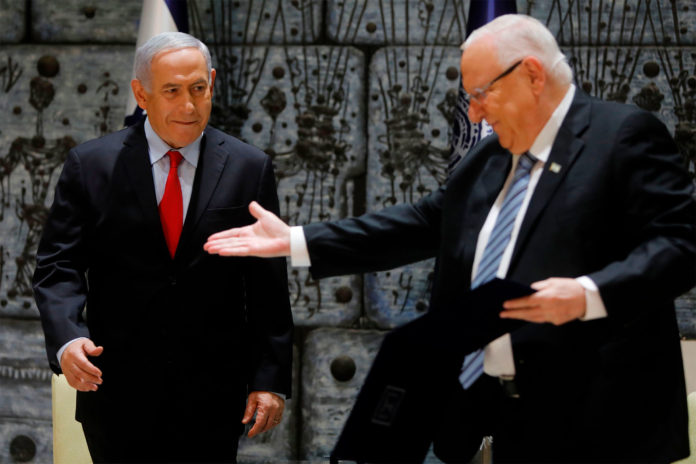
The clock is ticking down to Prime Minister Benjamin Netanyahu forming a coalition deal.
Israel’s leader has officially received a 14-day extension from President Reuven Rivlin and has until May 28 to form the next government in the Knesset.
Only days remain and there is concern Likud could declare an end to coalition negotiations due to excessive demands from factions with new elections weeks after the country went to the polls last month.
Netanyahu is still to agree a deal with any party with smaller parties. The current impasse is unprecedented in Israeli political history.
“I hope we will find a way, as soon as possible, to bring (party leaders) back to reality so that we can form a strong and stable government for the State of Israel that will continue to lead the country to new heights,” he said at Sunday’s cabinet meeting.
Rabbi Haim Drukman, Jewish Home, told Israeli radio that without education and justice ministries going to Union of Right-Wing Parties, Netanyahu could not form a government.
If Netanyahu fails in his bid to form a government, Rivlin could offer former IDF chief Benny Gantz, whose Blue and White party tied Netanyahu’s Likud with 35 seats, an opportunity to form a coalition.
Meantime, Attorney General Avichai Mandeblit has postponed a Netanyahu’s pre-indictment hearing for Prime Minister Benjamin until the beginning of October on three corruption charges.
Netanyahu’s lawyers successfully requested an extension to review prosecution material.
The Justice Ministry had earmarked the hearing by July 10 but it will now take place around the High Holidays of Rosh Hashanah and Yom Kippur.
Netanyahu denies the charges citing them as a witch hunt to depose him from office.
News from the Attorney General came after Netanyahu was having issues in Likud over plans to have coalition partners commit to passing an ‘immunity’ law preventing a sitting Prime Minister being indicted.
Netanyahu faces corruption charges with the attorney general seeking indictments.
Former Likud Minister Limor Livnat criticised the plan in Yedioth Ahronoth, while MK Gideon Sa’ar, described the initiative as “corrupt.”
But there was support from Likud MK Miki Zohar, allowing elected officials to be investigated only after approval by both the Knesset House Committee and Knesset plenum.
The amendment aims to overturn a 2005 amendment.
“They decided to indict the Prime Minister for bribes without him receiving a shekel,” Zohar said at a meeting of a special committee. “When I saw this happening, I concluded that there is nothing more justified than the Immunity Law.
“I will do everything in my power to pass it. We will consider each case on its own merits and every matter will be examined in depth by the Knesset House Committee.”
Zohar added Attorney General Avichai Mandelblit had been pressured to bringing charges against Netanyahu.
“When I saw the pressure on the Attorney General, I understood exactly what I was up against,” he noted. “Unfair and unreasonable pressure has been placed on him simply because of one thing, that, G-d forbid, he reveals the truth and decides that no indictment will be brought against a public official.”
Former Defense Minister Moshe Ya’alon has an opposing view.
“Essentially, everyone is now a slave to saving Netanyahu’s skin from the specter of justice.” he said.
“We will fight against personalised legislation, which first and foremost is designed to turn the Knesset into a haven for criminals, led by Netanyahu. We will fight with the public, we will get people out on the streets as soon as Saturday night at Tel Aviv Museum plaza. I urge people to come, he cannot ignore it.”
Ya’alon added that most people would not understand what was behind a push for a law change, explaining Blue and White lawmakers had recited a 57-page list of suspicions against Netanyahu that many MKs did not understand.
Away from coalition talks, the cabinet voted to overturn a 2013 law limiting the number of government ministers to 18 and deputy ministers to four.
The coming days though will be dominated by ongoing endeavours to conclude coalition talks.
By Leah Waxler









